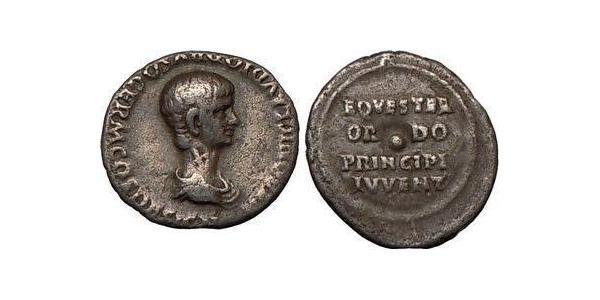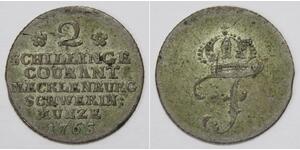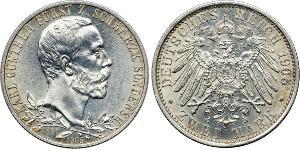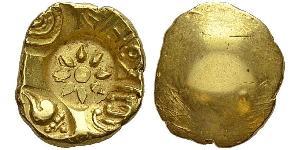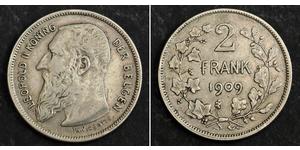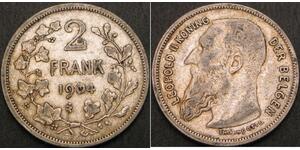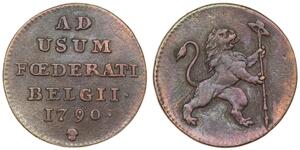[ 2202] NERO, as Caesar, under Claudius 51-54 A.D. Silver Denarius (19mm, 3.34 gm.), Rome, 51-54 A.D., RARE. Reference: RIC 79 [Claudius]; BMC 93; RSC 97. NERONI CLAVDIO DRVSO GERM COS DESIGN, draped bust right. EQVESTER/OR-DO/PRINCIPI/IVVENT in four lines on shield with vertical spear behind. Provided with certificate of authenticity. CERTIFIED AUTHENTIC by Sergey Nechayev, PhD - Numismatic Expert Nero Claudius Caesar Augustus Germanicus (15 December AD 37–9 June AD 68), born Lucius Domitius Ahenobarbus, also called Nero Claudius Caesar Drusus Germanicus, was the fifth and last Roman emperor of the Julio-Claudian dynasty. Nero was adopted by his great uncle Claudius to become heir to the throne. As Nero Claudius Caesar Augustus Germanicus, he succeeded to the throne on 13 October 54, following Claudius's death. Nero ruled from 54 to 68, focusing much of his attention on diplomacy, trade, and increasing the cultural capital of the empire. He ordered the building of theaters and promoted athletic games. His reign included a successful war and negotiated peace with the Parthian Empire (58–63), the suppression of the British revolt (60–61) and improving relations with Greece. The First Roman-Jewish War (66–70) started during his reign. In 68 a military coup drove Nero from the throne. Facing assassination, he committed suicide on 9 June 68. Nero's rule is often associated with tyranny and extravagance. He is known for a number of executions, including those of his mother and step-brother, as the emperor who "fiddled while Rome burned", and as an early persecutor of Christians. This view is based upon the main surviving sources for Nero's reign—Tacitus, Suetonius and Cassius Dio. Few surviving sources paint Nero in a favorable light. Some sources, though, including those mentioned above, portray him as an emperor who was popular with the common Roman people, especially in the East. The study of Nero is problematic as some modern historians question the reliability of ancient sources when reporting on Nero's tyrannical acts. Nero was born with the name Lucius Domitius Ahenobarbus on 15 December, AD 37, in Antium, near Rome. He was the only son of 12, by Gnaeus Domitius Ahenobarbus and second and third cousin Agrippina the Younger, sister of emperor Caligula. Lucius' father was the grandson of Gnaeus Domitius Ahenobarbus and Aemilia Lepida through their son Lucius Domitius Ahenobarbus. Gnaeus was a grandson to Mark Antony and Octavia Minor through their daughters Antonia Major and Antonia Minor, by each parent. With Octavia, he was the grandnephew of Caesar Augustus. Nero's father had been employed as a praetor and was a member of Caligula's staff when the latter traveled to the East. Nero's father was described by Suetonius as a murderer and a cheat who was charged by emperor Tiberius with treason, adultery, and incest. Tiberius died, allowing him to escape these charges. Nero's father died of edema (or "dropsy") in 39 AD when Nero was three. Lucius' mother was Agrippina the Younger, who was great-granddaughter to Caesar Augustus and his wife Scribonia through their daughter Julia the Elder and her husband Marcus Vipsanius Agrippa. Agrippina's father, Germanicus, was grandson to Augustus's wife, Livia, on one side and to Mark Antony and Octavia on the other. Germanicus' mother Antonia Minor, was a daughter of Octavia Minor and Mark Antony. Octavia was Augustus' second elder sister. Germanicus was also the adoptive son of Tiberius. A number of ancient historians accuse Agrippina of murdering her third husband, emperor Claudius. See Roman Emperors family tree. Physical appearance In the book "The Lives of the Twelve Caesars" the Roman historian Suetonius describes Nero as "about the average height, his body marked with spots and malodorous, his hair light blond, his features regular rather than attractive, his eyes blue and somewhat weak, his neck over thick, his belly prominent ...
type to read more

|
Posted by:
anonymous 2015-08-19 |
Similar Coin Groups
2025-05-27
- New coin is added to 2 Franc Belgium Silver Leopold II of Belgium(1835 - 1909)
2 Franc Belgium Silver Leopold II of Belgium(1835 - 1909)
group has 7 coins / 7 prices
⇑
BELGIUM 2 Francs 1904 - Silver .835 - VF - 4618
2025-05-24
- New coin is added to 1 Liard Belgium Copper
1 Liard Belgium Copper
group has 4 coins / 4 prices
⇑
Austrian Netherlands - Liard 1790 - Head
You may be interested in ...

